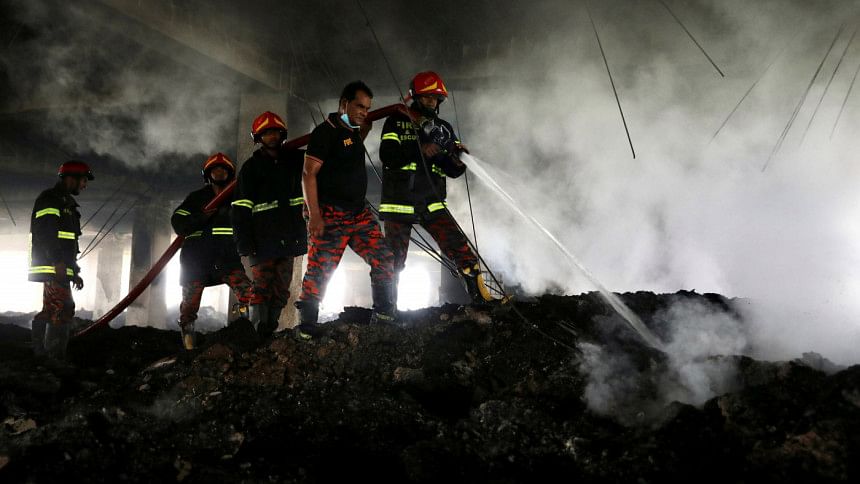Backlogged factory inspections: Now is the time to act

We have witnessed yet another factory fire catastrophe but this time it involves a factory which does not cater to international garment retailers—hence, loss of lives of the workers burnt inside the Hashem food factory would perhaps be forgotten even sooner. Such a catastrophic violation of human rights portrays a negative image for Bangladesh and affects the credibility of our international commitment to protect fundamental human rights. It is high time that we revisit and remodel our legal and policy framework that exists for the workers' safety.
Reportedly there had been an inspection in the Hashem Factory by the Department of Inspection for Factories and Establishments (DIFE) just a month before the fire. What is worrying is that such gross violations of the basic fire safety provisions were left unnoticed in the inspection. DIFE is also the issuing authority of factory license, which, as per law, can be cancelled or temporarily suspended, if it appears to the DIFE inspectors that a factory is posing danger to the life and safety of its workers. Clearly none of these provisions came of any real use, which might have prevented the fire and the consequent loss of lives.
Together with investigating how the inspection authorities overlooked such gross violations, the overall efficiency and capacity of DIFE needs to be re-examined. Firstly, the number of inspectors is highly inadequate compared to the vast numbers of factories and establishments in the country. As per the 2018-19 annual report of DIFE, till August 2019, there were 993 approved posts, but against which only 653 persons were recruited, among whom only 308 were recruited as inspectors. Having such a shortage of manpower means that the authority essentially has to prioritise among sectors and naturally that will leave out a large number of factories and establishments from inspection.
There had been reports in recent years regarding the possibility of an increase in the number of inspectors, which is absolutely essential at this point. In addition to that, however, ensuring skilled inspection is vital especially for inspecting building and fire safety provisions of factories, which essentially requires specialised skills and training. Proposals regarding creating a separate industrial safety unit at the DIFE had also been discussed lately. Considering the high risks for workers in non-compliant factories, such a specialised industrial safety unit will be a welcome change. DIFE also needs to narrow down its focus to essential inspection and compliance only, reducing other administrative roles that the department is often expected to perform.
The number of unannounced inspection needs to be increased as well which was also stressed by the ILO Committee of Experts (CEACR) in their observation regarding Bangladesh in 2020. Again, increasing complaint-driven inspection is important and for that, broadening the scope for individual workers to make complaints, need to be ensured. Although, in recent years some efforts have been made in this respect, including launching of an online complaint platform (LIMA), such efforts are not perhaps yielding the desired results. The LIMA application does not allow applicants to remain anonymous and hence due to fear of retaliation from the employers, workers would not generally be keen on using such platforms. Although the annual report of Ministry of Labour and Employment (MOLE) says that in the year 2019-2020, DIFE had disposed of 2,902 complaints out of 2,945, the available data does not indicate as to what these complaints were for or against which companies they were raised and what follow up measures had been taken in response to such complaints.
Another major clog in the system is regarding the lack of any authority given under the law to the inspectors to make any order with immediate executory force in the event of imminent danger to the health or safety of the workers. This is required specifically by the ILO Convention no. 81 on Labour Inspection—which Bangladesh had ratified. The DIFE inspectors are authorised under our law to recommend the employers to remediate any violation and can at best file cases in the Labour Courts. Knowing the long delay in disposal of cases in the labour courts and the very nominal penalty for violations given under the Labour Act, such measures have very less impact on the non-compliant employers (for instance, under the Labour Act, the punishment for employing children in violation of the law is only up to Tk 5,000 fine). At the policy level, its crucial now to identify how allegations and reports of violation against employers can be first addressed in an alternative forum before resorting to formal adjudication. In the ILO committee of experts, Bangladesh had indicated about the possibility of having a separate legal unit with additional legal officers for follow up of cases filed in the labour courts, but that too possibly hasn't taken place as yet.
In several reports, allegations of irregularities on part of individual inspectors had also come up. Hence, when we focus on remodelling the industrial safety inspection mechanisms, we also need to identify ways to develop DIFE as a more accountable, efficient and transparent authority for the protection of the safety and health of the workers. Together with DIFE, we also need to increase capacity and efficiency of our Fire Service and Civil Defence authority to ensure more efficient fire safety inspection and reporting of hazardous buildings. Role of the authorities responsible for building constructions need to be scrutinised as well to identify the loose ends in inspection and monitoring of illegally built constructions. We also need to remember, in any effort that may address safe workplaces in the near future, to count in the millions of our workers working in the informal economy. Each life must be valued and now is the time to act and to act responsibly.
Taslima Yasmin is Associate Professor, Department of Law, University of Dhaka.
Email: [email protected]

 For all latest news, follow The Daily Star's Google News channel.
For all latest news, follow The Daily Star's Google News channel. 



Comments